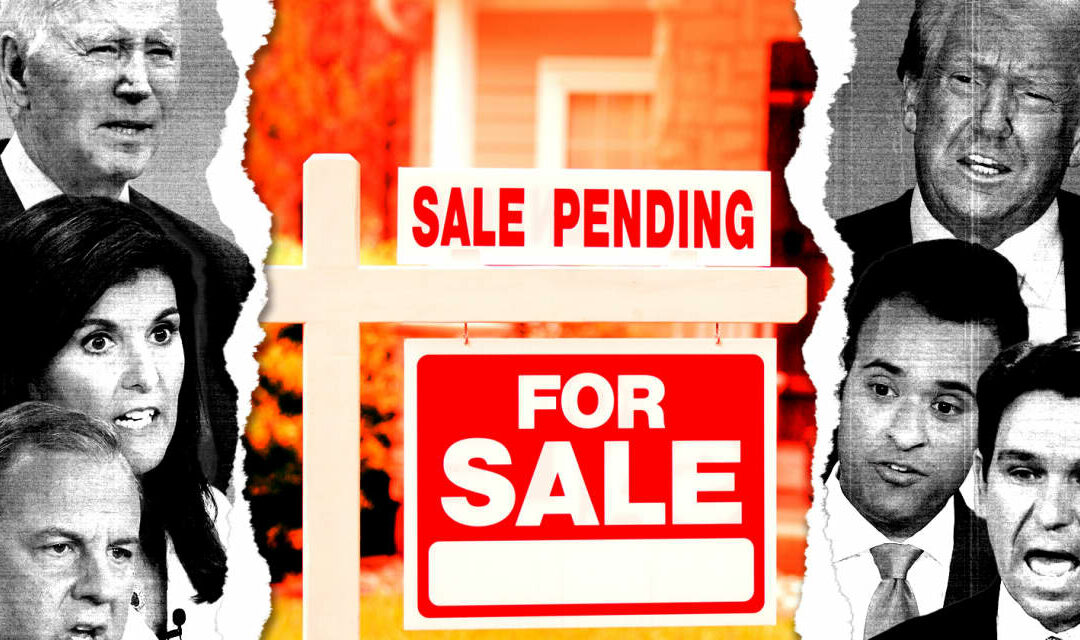As homeownership looks increasingly out of reach for many younger Americans, what should the federal government do to make houses more affordable?
Republican presidential candidate Nikki Haley faced that question at the last GOP debate, which took place Dec. 6. In response, she criticized how the Federal Reserve has handled inflation and discussed improving supply chains for home builders, but she didn’t offer specific proposals regarding U.S. housing policy.
Haley’s hardly alone among the GOP White House hopefuls in not offering a lot of detailed prescriptions to address the tough market for home buyers. That could be because those candidates see the state of affairs as something that can’t be fixed by Washington, according to Ed Pinto, a senior fellow at the American Enterprise Institute and co-director of the conservative think tank’s housing center.
“On the Republican side, there’s more of a recognition that this is a state and local issue,” Pinto said in an interview.
Meanwhile, a White House spokesperson and allies of President Joe Biden said the Democratic incumbent has addressed elevated home prices through efforts such as reducing mortgage-insurance premiums for borrowers who rely on a Federal Housing Administration program. They also point to his push to expand the low-income housing tax credit.
“More work needs to be done — and the president has a plan to lower housing costs by building and preserving nearly 2 million homes, providing down-payment assistance to home buyers who need it, and lowering rents through rental assistance for hundreds of thousands of families,” the spokesperson told MarketWatch in a statement, adding that Republicans in the divided Congress should vote for the president’s proposals.
Haley blasts Fed, while Ramaswamy targets land-use rules
At the Republican debate earlier this month, Haley said she recently saw how hard it was for her daughter and son-in-law to buy a home, saying it had to do with the Fed doing a “terrible job when they allowed all of that money to go through.” That appeared to be a reference to the U.S. central bank having an easy-money policy for too long.
Haley also called for addressing supply-chain problems for home builders
XHB,
mentioned some deregulation for mortgage lending, reiterated a promise to cut federal-government spending and debt in order to reduce inflation, and criticized the 2024 GOP presidential primary’s front-runner.
“As much as everybody wants to talk about how Donald Trump had a good economy, $9 trillion in debt he did just in four years, and we’re all paying the price of that, including those mortgage prices,” said Haley, who is a former South Carolina governor and ex-ambassador to the United Nations.
A report last year from the Manhattan Institute, a conservative think tank, found that the legislation and executive actions signed by Trump added about $8 trillion in 10-year budget deficits, rather than the $9 trillion Haley mentioned. Haley’s campaign didn’t respond to a request from MarketWatch to elaborate on her housing-related comments at the debate. Former President Donald Trump’s campaign also did not respond to a request for comment.
Other Republican presidential hopefuls have talked about reducing inflation overall, rather than focusing on housing in particular. Trump, for example, has said he would end “wasteful spending” to fight high prices, as well as “immediately unleash energy
XLE
production.”
Related: Here’s how the Republican presidential candidates say they’ll whip inflation
At the Dec. 6 debate, Florida Gov. Ron DeSantis spoke about having recently met a young college graduate in Iowa who said he had “no chance to afford a home and start a family.”
“That is taking the American dream away from people, so we’re going to get the inflation down, we’re going to get the interest rates down, we are going to reduce spending,” DeSantis told the debate audience. “We’re also going to open up all of our domestic energy for production, lower your gas
RB00,
prices, lower the price of fuel.”
The DeSantis campaign did not respond to a MarketWatch request for comment.
During an earlier debate on Nov. 8, GOP presidential hopeful and entrepreneur Vivek Ramaswamy called for easing land-use restrictions in order to deliver more housing.
“The land-use restrictions are constricting the supply of housing. That’s making housing more expensive for ordinary Americans across this country,” said Ramaswamy, whose campaign also did not respond to a MarketWatch request for comment.
That position has elicited praise on the other side of the political spectrum.
“It’s encouraging to hear a Republican presidential candidate like Ramaswamy saying we need to build more, but the question is what we can do at the federal level, and the devil’s in the details there,” said Brendan Duke, senior director for economic policy at the Center for American Progress, a liberal think tank. Duke, who was previously an economic adviser in the Biden White House, noted that there is a bipartisan bill called the Yes In My Backyard (YIMBY) Act that aims to condition certain federal grants on easing land-use rules.
When asked about home prices, former New Jersey Gov. Chris Christie’s 2024 presidential campaign pointed to his past statements, such as one in which he pledged to cut spending in order to reduce inflation and bring about lower interest rates.
“You have young people in this country who want to buy a home, can’t afford to do it with interest rates up over 7%,” Christie said in a CNBC interview, referring to the level for mortgage rates earlier this year before their recent decline.
Related: When will mortgage rates drop enough to entice homeowners to sell? Experts say this is the ‘magic’ number.
And see: It’s time for a tax credit for home sellers to prod owners to list their houses, Realtors say
Biden’s efforts: ‘Bang for your buck’ versus ‘unintended consequences’
A lot of Biden’s housing-related efforts are “really targeted at some of the lowest-income households,” and focusing on just that group of home buyers probably provides “more bang for your buck,” said Duke, of the Center for American Progress.
In addition, he praised the housing provisions in 2021’s $1.9 trillion COVID-19 relief package, known as the American Rescue Plan, saying they were a “down payment on improving the housing market.” Those measures included money for affordable-housing programs and a fund aimed at preventing foreclosures and evictions.
A spokesperson for Biden’s 2024 campaign told MarketWatch in a statement that the president has “worked tirelessly to lower costs and make housing more affordable” and that a second Trump term “would take a wrecking ball to the progress President Biden has made and force families out on the street.”
But Pinto from AEI, the conservative think tank, criticized the Biden administration’s move to reduce premiums on FHA-insured mortgages, arguing that it’s just another example of reducing the cost of credit, which leads to higher prices.
“When people ask me, ‘What do you want the federal government to do?’ I basically say, ‘Don’t do anything on the supply side, with the possible exception of freeing up land,’” Pinto said, referring to how the U.S. government is the nation’s largest owner of land and can sell it with density requirements for developers.
“Everything else is probably going to have unintended consequences, as everything largely the federal government’s done for many decades has had unintended consequences. I’d rather have the laboratories of the states working through this,” he told MarketWatch.
Now read: One federal agency’s plan to help buyers through a ‘difficult’ housing market









